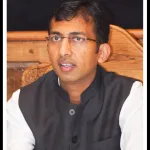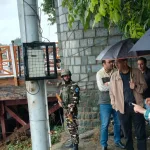Srinagar, Feb 26: As soft initiative under CSIR Mission on Region Specific Smart Agro-technologies for enhancing Soil and Plant Health, the CSIR-Indian Institute of Integrative Medicine organised a three-day symposium on the theme “Translating Technology into Practice: The Smart Know-Hows of Soil and Crop Management” at its Branch Lab. here on Monday.
Dr Zabeer Ahmed, Director CSIR IIIM Jammu, the chief guest inaugurated this three-day event in presence of Prof Raihana Habib Kanth, Dean Faculty of Agriculture, SKUAST, guest of honour, subject matter specialists and scientists of CSIR-IIIM and SKUAST Kashmir.
About 70 participants including research scholars, agricultural engineers, agricultural and horticultural technocrats are registered in the Symposium. Speaking at the event, Dr Zabeer Ahmed, while highlighting the contributions of the Institute informed the participants about the activities undertaken at the Institute very right from its inception till date for the translational research and development in multiple areas for the overall societal development and services for the industrial sector has been impactful and has benefited the researchers, farmers, academia and industry at region as well as national level. The significant work being done under CSIR Missions like Aroma Mission and Floriculture Mission has generated tangible outcomes and success stories through farmer empowerment and development of agritech startup ecosystem in the region, he said. While complementing the organizers of the symposium Dr Zabeer Ahmed said that the themes of the technical sessions are relevant to address the knowledge gaps for achieving the sustainable crop yields and optimal utilization of the resources. Guest of Honour at the event, Prof. Raihana H. Kanth in her key note address on Climate Smart Agriculture appreciated the launch of the CSIR Mission for development of region specific smart agrotechnologies and highlighted the challenges posed to the agrarian landscape in the country in the backdrop of the changing climatic and edaphic factors. The mitigation approaches to overcome the disastrous effects of weather vagaries require innovative knowledge tools like weather and disease forecasting systems for decision making, she informed. Earlier, Dr Shahid Rasool, Nodal Scientist, CSIR Mission on Region Specific Smart Agriculture informed that in the evolving agricultural landscape, the translation of technology into practice has become essential for optimizing soil health and maximizing crop productivity. Smart soil and crop improvement strategies leverage AI algorithms for predictive analytics, autonomous farming, and robotic system technology for precision crop management and sustainable land use planning.
On day 1, after inauguration, two technical sessions were held during which Dr Nasheeman Ashraf, Principal Scientist, CSIR IIIM delivered lecture on Role of Microbes for Catalyzing Agriculture, Dr Shabir Bangroo, Scientist SKUAST Kashmir spoke on Application of Remote Sensing and GIS Techniques for Soil Monitoring and Management and Dr Shaista Nazir, Scientist SKUAST Kashmir delivered a presentation on Understanding the Factors Influencing Spatio-temporal Variability in Soil Fertility. Dr Khurshid Ahmad Bhat, Principal Scientist, delivered welcome address, Dr Iqra Farooq, Sr. Project Associate conducted the proceedings while as Dr Nasheeman Ashraf, Principal Scientist presented vote of thanks.





